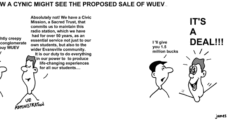Today, supporters of University of Evansville’s college radio station WUEV (see our recent coverage, as well as the story of how WUEV fought off a possible sale many years ago) congregated on the Evansville, Indiana campus for a “Fight for WUEV” rally. “This gathering, organized by students, matters given new unconfirmed updates from multiple sources that plans are quickly being made to sell WUEV,” according to the event invitation.
Rumors that the private university plans to sell the FM radio license have been amplifying and last night, Tri-State Homepage wrote, “Eyewitness News is working to get reaction from the University of Evansville after it was reported over the air that it has sold WUEV Radio for $350,000. That was announced tonight on WUEV. A former station manager, Dete Meserve, posted on the WUEV alum Facebook page that a trustee confirmed to her the sale was a done deal.”
This is in spite of a press report on Friday that the station had not been sold. According to an article in the Evansville Courier and Press, “The University of Evansville said a September email sent from its provost to faculty and staff about WUEV was wrong, and no agreement is in place to sell the campus radio station.”
The latest speculation along with the vague details provided by the university don’t leave much reassurance for WUEV fans and supporters, particularly in light of a September 7 email from University of Evansville’s Provost Michael Austin. As quoted by the Courier and Press, Austin wrote by email on September 7,
“You may also have heard or read that UE has sold its WUEV radio station license to a media group. This is something that we have been discussing for several months, and I want to give you a little bit of background. First, before we made this decision, we consulted with the Communication Department, who assured us that the station itself was not an important part of their academic program. We did not want to, and would not have jeopardized an asset that was currently being used for our core purpose of educating students.
But we also faced a crossroads. The person who had been managing the station chose to retire, and the FCC requires that we have somebody in place to serve as a manager. At the same time, we had what I consider to be a very good offer to sell our license to use the frequency. Combining the costs that we would continue to incur if we kept the station with the opportunity cost of foregoing the offer, we would have to be willing to commit a million dollars over the next few years to keep the station operational, at a time when most broadcasting is moving to the Internet and radio audiences are vanishing. We simply could not justify that kind of financial commitment in our current budget environment.”
So, it does appear that WUEV’s future is murky, since some sort of talks have been taking place with interested buyers. Perhaps even more disturbing to me is Austin’s comment that, “…most broadcasting is moving to the Internet and radio audiences are vanishing…”
This ill-informed statement flies in the face of numerous studies about the ongoing relevance of terrestrial radio. Additionally, the FCC’s most recent quarterly station count shows continued growth in licensed broadcast radio stations in the United States. As of September 30, 2018, there were 15,493 licensed full power radio stations, 7848 FM translators and boosters, and 2175 low power FM radio stations. Compared with data from three years ago, the number of broadcast radio stations has increased. So, no, most broadcasting is NOT moving to the internet; although all radio stations recognize the importance of having an online presence.



